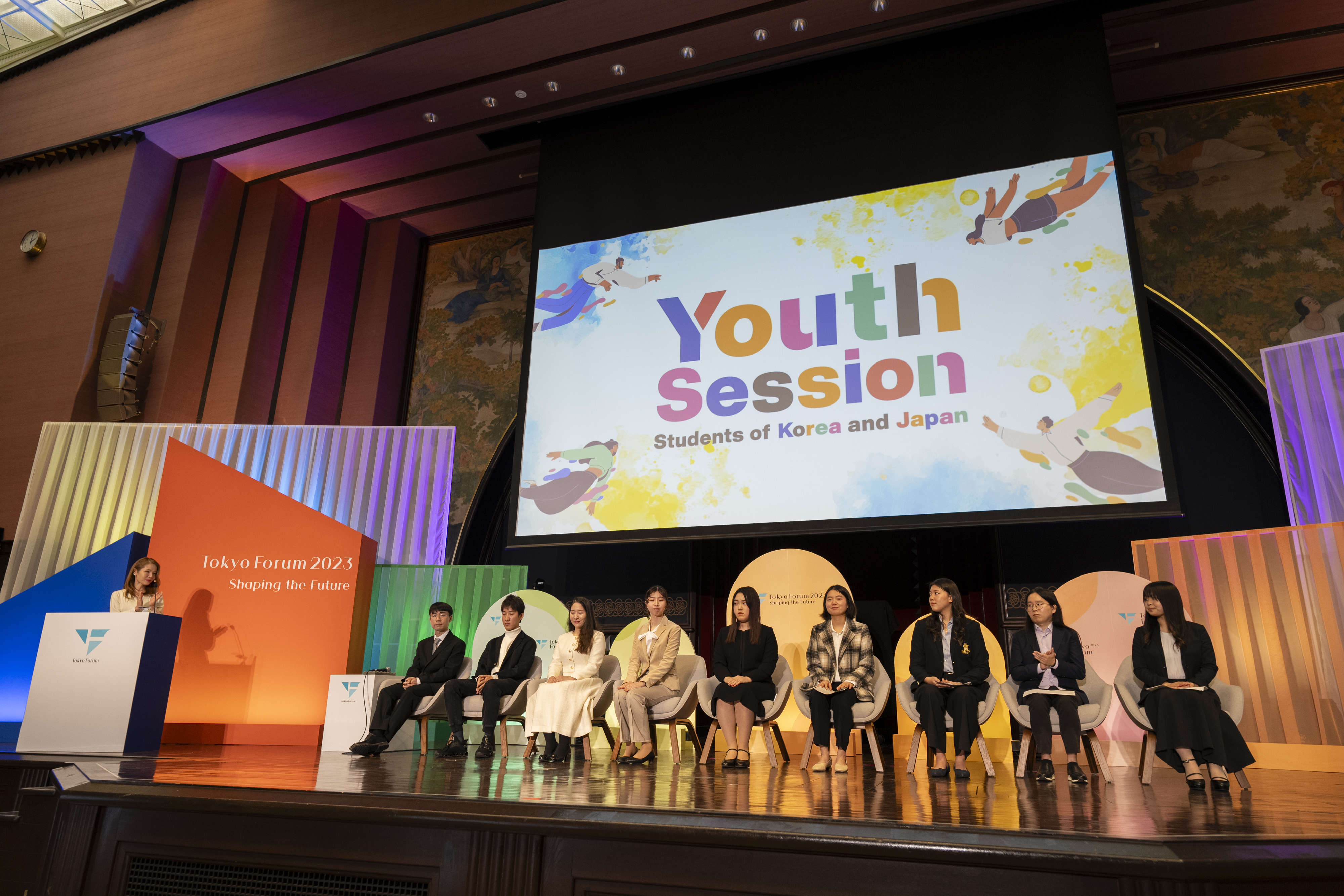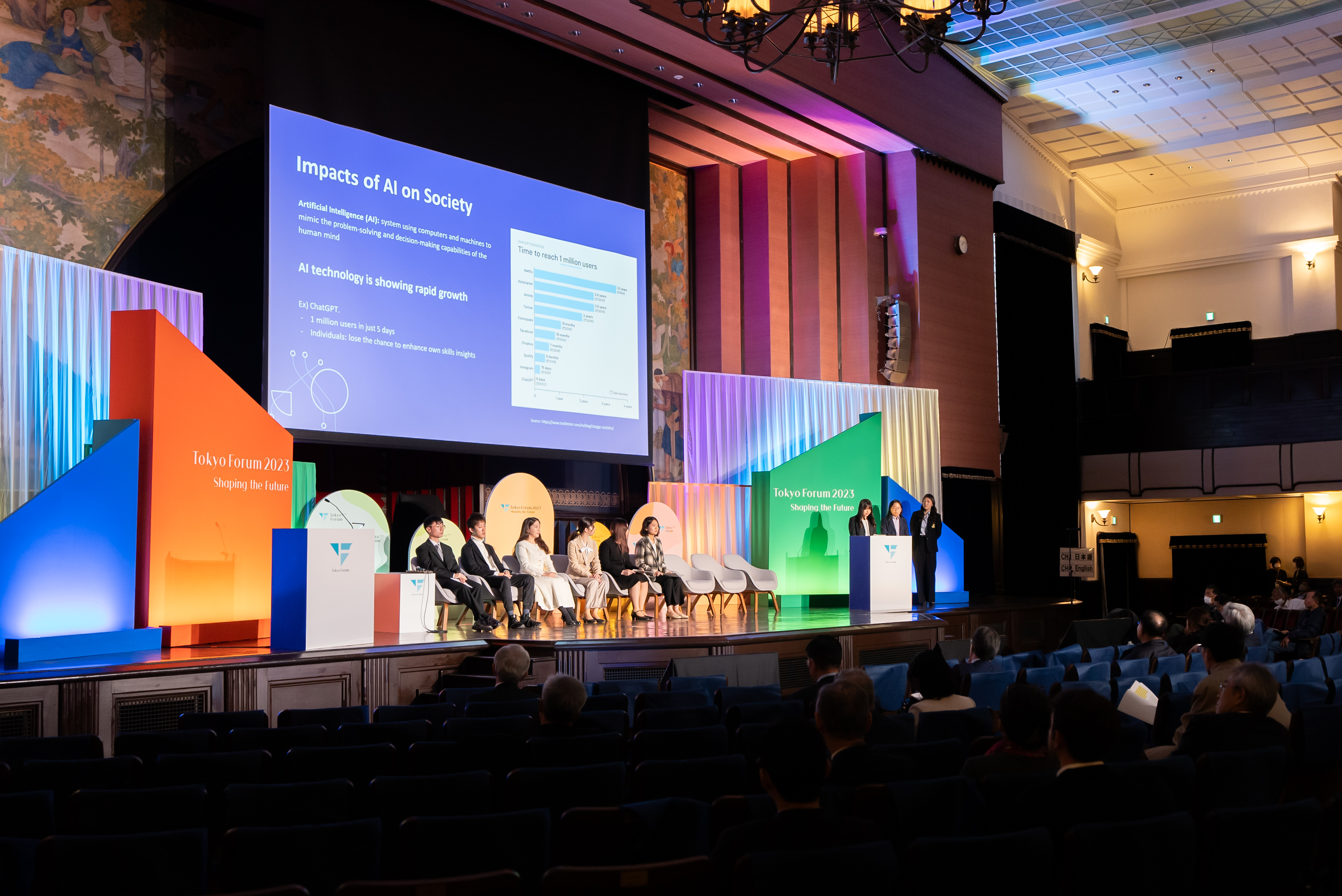Report on Youth Session


Since 2022, Tokyo Forum has incorporated the views of the youth who will be the main actors in the future and have their own views on the topics discussed. This year, the Youth Session made its debut as an official event of the Tokyo Forum and the online as well as off-line audiences had an opportunity to hear their discussions. In the Tokyo Forum 2023, a total of 10 students from UTokyo and Korean universities discussed "Cultivating Humanity amid Social Divisions and Digital Transformation” to provide views from the younger generations on this topic. The participants were:
・CHOI, Kangwoo: Department of Economics, Seoul National University
・IIMORI, Eiji: Faculty of Engineering, UTokyo
・JU, Ryujung: Department of Chemical and Biological Engineering, Sookmyung Women’s University
・OH, Soo Jee: College of Liberal Arts (Psychology), Yonsei University
・OMICHI, Mayuko: College of Arts and Sciences (Junior Division), UTokyo
・ROH, Eunsaem: Graduate School of International Studies, Ewha Women’s University
・SHIMADA, Shiori: Faculty of Law, UTokyo
・SONG, Hyeonho: School of Computing, Korea Institute of Science and Technology
・TOYOSHIMA, Shunsuke: College of Arts and Sciences (Senior Division), UTokyo
・YONEIMA, Saki: College of Arts and Sciences (Junior Division), UTokyo
The Youth Session started in September 13, 2023 with an initial face-to-face meeting in Seoul. After several on-line meetings, they had a final session in the Yasuda Auditorium of the University of Tokyo on December 1 between 1:00pm and 2:00pm.
The session started with a critical question on why some important problems persist, despite decades of much public attention and resources made available to solve them. They picked three examples of such problems, each related to AI, environmental injustice, and low birth rates.
1. The first subgroup raises a pivotal question: “Why isn’t the youth given a louder voice in creating protective measures from AI?” By examining the rapid advancements of AI and outlining concerns about its potential misuse, we emphasized an increased vulnerability of young users to issues such as job displacements, abusive behavior, inappropriate content, and privacy breaches. Despite implementation of countermeasures by those in authoritative positions, primarily the older generation, these actions have proven to be temporary fixes, lacking enduring solutions. This underscores the urgent need for the inclusion of youth perspectives in decision-making processes, aiming for more effective and sustainable solutions to address the challenges posed by AI. They advocate for a collaborative effort to shape a shared digital future that incorporates the insights and concerns of the younger generation.
2. Second subgroup addressed the environmental burden transfer between region and generation. They criticized how sustainability efforts in high-income countries, including exports of hazardous waste, lead to pollution and exploitation in low-income countries. They argued the need to look at the injustice in this structure and avoid simplistic solutions that may further burden low-income countries. In addition, they criticized the older generation for passing down the environmental burden to the future generation. They pointed out how technology without considering the future can lead to long-term environmental crises. They urged a shift towards a more responsible and long-term perspective rather than taking superficial measures. In conclusion, the team argued for reconsidering the current system, emphasizing the need for responsibility for a sustainable future.
3. Last subgroup started by questioning the premise under the current “low-birth rate policies”, criticizing that the policies’ ultimate goal lies on the group level, especially the nation, not on the individual welfare. They argued that this issue should be completely redefined as the problem of guaranteeing everyone’s human rights to choose to have a child. They showed that the current system fails to protect the individual rights through two examples: They show how current marriage system in Japan limits individuals’ rights to make choices regarding families, and how a newborn’s basic rights to life are undermined in single-dad families in Korea due to rigid child registration system. They pointed out that such negligence over the human rights of those who are excluded by the system is the result of the responsible agents’ incentives to pursue economic efficiency and political power, and therefore that the same problem can happen to anyone without transforming the system toward the one that can make people prioritize human rights over different values.
Throughout the session, the youth discussed the distinct systems that hinder resolution and reproduce the problems, thereby making them persistent. Those systems are built within the new world reformed by digital transformation, and at the same time, built upon the social divisions splitting different nations, generations, and other agents. They found different driving forces that make each system work in its own direction, and not reach the common good. The youth members agreed that this is not something they can change through tinkering with parts of the system, as people have done until now. Therefore, they urged the establishment to create a clear blueprint of an alternative system together with the younger generation.